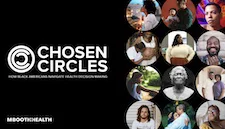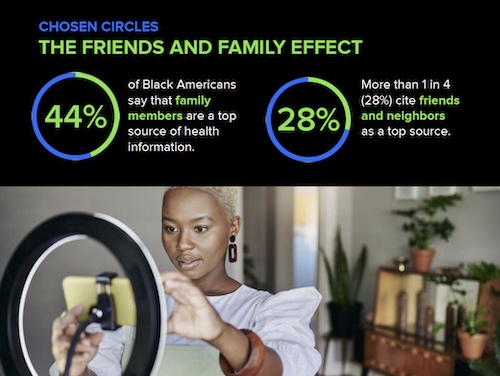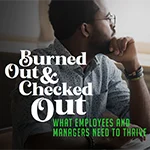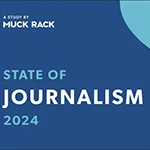 |
Black Americans are disproportionately affected by the health disparities prevalent in society today, and that shapes how receptive they are to the healthcare information that marketers and communicators present to them, according to a new report from M Booth Health and Sprout Insight, a women- and minority-owned strategic consulting and market research firm.
“Chosen Circles: How Black Americans Navigate Health Decision Making” looks at the strategies Black healthcare consumers employ to make sure they are receiving the care they need.
More than a third of respondents said they do not feel represented in health information, do not feel that health organizations care about people with their background and don’t always trust the health information they receive.
That lack of trust, the report says, is leading to increased rates of illness among Black healthcare consumers. More than one in five survey respondents said they have gotten sick in the last 12 to 18 months because they did not have access to necessary health information.
Black consumers are dealing with this unequal healthcare landscape by taking matters into their own hands. “Our research showed that Black Americans are now the most proactive racial/ethnic group of all when it comes to managing their health.”
 |
One of the main ways that plays itself out is through the formation of “chosen circles”—groups of trusted people and sources that consumers go to for advice and support when making health decisions.
For 36 percent of the respondents, healthcare providers are not in their chosen circles. While 53 percent say pharmaceutical companies are an important source of health information, only 13 percent say they have actually learned about health from a pharmaceutical company website.
A majority of respondents (57 percent) said that curating multiple sources of health information makes them feel more confident about their decision making, while 50 percent cited the desire to hear the opinions of people who have experienced the same healthcare issue that they are experiencing.
More than six in 10 of the survey respondents (61 percent) said they have created such personal networks, and these networks are seen across several demographics, with 68 percent of Black mothers, 62 percent of Black men, 60 percent of Black women and 59 percent of Black Gen Z’ers having formed them.
The survey also says that Black healthcare consumers are looking to those circles to fill in the inclusion gaps that they find in more mainstream healthcare communications. More than four in 10 (42 percent) would be more likely to trust information that comes from a member of their own community.
The study polled 2,539 demographically diverse adult consumers between Nov. 30 and Dec. 11, 2022.


 Consumers who once demanded convenience now require consistent, multi-channel experiences that cater to them at every point. Brands must have a clear, audience-appropriate, and channel-specific voice across all platforms.
Consumers who once demanded convenience now require consistent, multi-channel experiences that cater to them at every point. Brands must have a clear, audience-appropriate, and channel-specific voice across all platforms. Employees at U.S. companies are experiencing high levels of burnout, but managers are lagging behind when it comes to their awareness of the problem
Employees at U.S. companies are experiencing high levels of burnout, but managers are lagging behind when it comes to their awareness of the problem Brand has a powerful effect on a company’s valuation, but the level of brand understanding in the investment community leaves a lot to be desired, according to a new study from Brodeur Partners, Interbrand and NewtonX.
Brand has a powerful effect on a company’s valuation, but the level of brand understanding in the investment community leaves a lot to be desired, according to a new study from Brodeur Partners, Interbrand and NewtonX. AI may still be viewed with a wary eye by most media pros, but its use is growing, according to a new study from Muck Rack.
AI may still be viewed with a wary eye by most media pros, but its use is growing, according to a new study from Muck Rack. A new study from Walker Sands says that some marketers have been putting the cart before the horse when it comes to the relationship between marketing channels and business outcomes.
A new study from Walker Sands says that some marketers have been putting the cart before the horse when it comes to the relationship between marketing channels and business outcomes.


 Have a comment? Send it to
Have a comment? Send it to 
No comments have been submitted for this story yet.